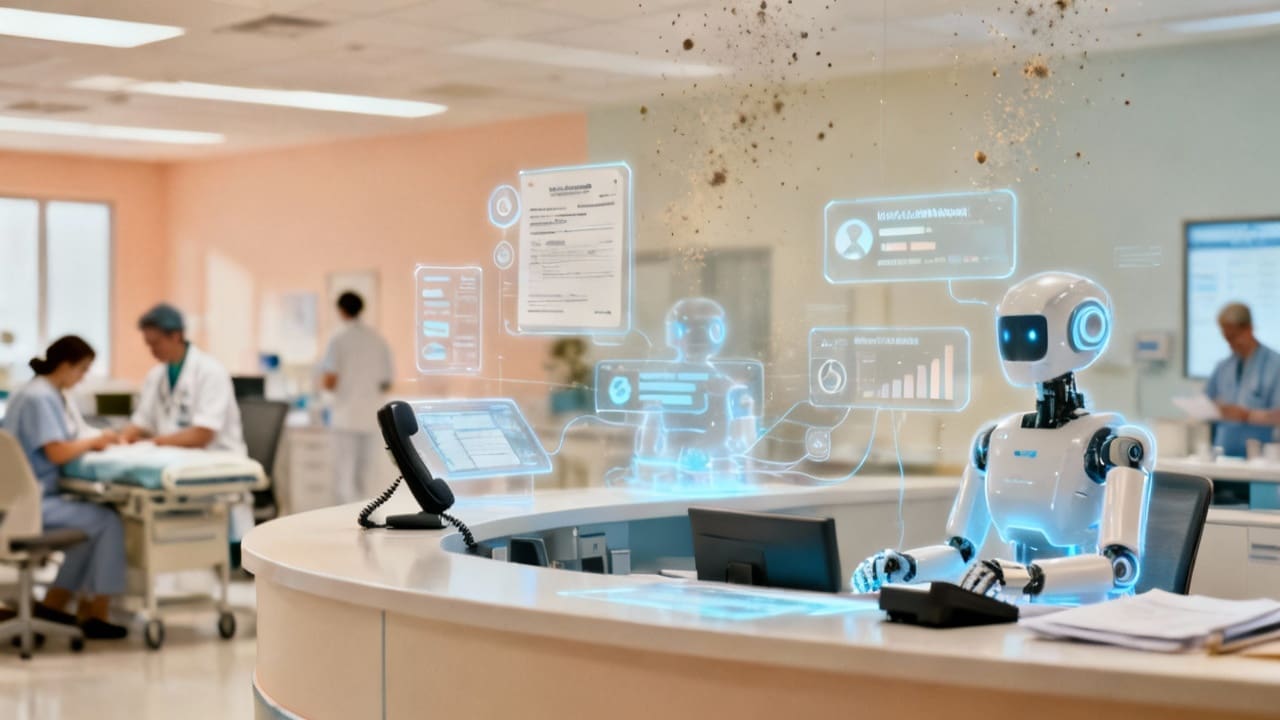On-Demand Outsourcing BPO Services for Healthcare Providers With 24/7 Coverage!
Save up to 70% on staffing costs!
Browse Specialty Staffing ServicesSummarize this blog post with:
How Conversational AI Is Going to Transform Healthcare in 2026?

Conversational AI is rapidly reshaping the healthcare landscape, shifting operations from human-heavy administration to intelligent, automated efficiency. In 2026, this transformation is set to accelerate faster than ever, redefining how clinics handle patient communication, scheduling, and documentation.
Even in Reddit’s well-known medical community r/medicine, doctors are already discussing how AI is lightening their workload. One physician shared, “I used to spend two hours every night finishing up notes. Now, our AI scribe does it while I talk to patients.”
That statement captures what thousands of healthcare professionals are realizing AI isn’t replacing doctors, it’s freeing them. Conversational AI is poised to transform every corner of healthcare operations from patient calls and appointment booking to EHR documentation, follow-ups, and prior authorizations.
If your practice is still managing administrative workflows manually, this is your final warning. Automation is no longer optional. Conversational AI is about to redefine healthcare efficiency, and your competitors are already preparing for it.
The Administrative Overload Healthcare Can’t Sustain
Healthcare today is not just about treatment, it’s about talking, documenting, verifying, and following up.
Every patient encounter generates layers of non-clinical work such as:
- Appointment coordination
- Insurance eligibility and prior authorizations
- Patient intake and reminders
- Prescription refills
- Follow-up communications
- EHR data entry and audit compliance
Each of these tasks matters, but none require a medical degree. Yet, according to Annals of Internal Medicine, clinicians still spend nearly 40% of their day handling this administrative noise.
As a result, doctors lose over 90 minutes daily to charting and face dozens of phone calls that interrupt clinical time. The constant repetition fuels exhaustion and burnout more than any medical emergency ever could.
What’s Coming in 2026 The Rise of Conversational AI?
Clearly, this pace isn’t sustainable. Burnout, staffing shortages, and patient dissatisfaction have become warning signs that healthcare needs automation now, not later. Handing over repetitive work to AI-driven virtual assistants is no longer about convenience, it’s about survival.
Conversational AI is not a basic chatbot. Instead, it’s a trained, compliant, context-aware system that understands medical language, processes complex workflows, and interacts naturally with patients through phone, text, or voice.
| Year | Market Size | CAGR | Key Impact |
|---|---|---|---|
| 2024 | $13.68 billion | – | North America leads with 54.51% market share |
| 2025 | $17.20 billion | 25.71% | $13 billion cost savings predicted from AI/ML |
| 2026 | $21.62 billion | 25.71% | $150 billion potential annual savings in U.S. healthcare |
| 2028 | $34.20 billion | 25.71% | 90% of hospitals expected to use AI technology |
| 2030 | $43.00 billion | 25.71% | Patient engagement remains largest segment at 29.51% |
| 2033 | $106.67 billion | 25.71% | Mental health therapy bots fastest-growing segment |
By early 2026, conversational AI systems will be able to:
- Understand and respond to patient intent using NLP (natural language processing)
- Access EHR and scheduling systems securely
- Verify insurance, submit prior authorizations, and check claim status
- Document patient visits automatically
- Personalize follow-up messages and health reminders
It’s the same underlying technology powering Alexa and Siri but redesigned for healthcare and fully compliant with HIPAA and SOC 2 Type 2 standards.
In short, AI is becoming the invisible workforce behind your medical office.

How Conversational AI Will Work Across Healthcare Operations?
Listening and Understanding
AI assistants can interpret natural conversations in real time.
“Hi, I want to move my appointment to next week.”
The system recognizes intent, verifies patient details, checks provider availability, and updates the schedule all within seconds. No human intervention. No delay.
Integration and Execution
Once intent is clear, conversational AI connects securely with scheduling, billing, or EHR platforms to complete the task automatically.
Response and Documentation
Finally, the system responds to the patient conversationally and logs the exchange for compliance. Every call or message is documented exactly as a staff member would do, only faster and with zero fatigue.
The Healthcare Workflows Conversational AI Will Redefine
-
AI Medical Receptionists
By early 2026, AI receptionists will become the first point of contact for most clinics. They will:
- Schedule, confirm, and reschedule appointments
- Handle patient intake and insurance checks
- Answer basic billing or procedure questions
Unlike human receptionists, they’re available 24/7, ensuring zero missed calls and consistent communication.
Staffingly Inc. already provides HIPAA-compliant AI medical receptionists, blending automation with real-time human oversight for accuracy and empathy.
Clinics using this hybrid model report:
- 60% fewer missed calls
- 75% faster appointment confirmations
- Continuous 24/7 availability across time zones
-
AI Medical Scribes
Documentation remains one of the most time-consuming burdens for clinicians. Conversational AI scribes use speech recognition and NLP to listen to provider-patient discussions and instantly create structured clinical notes.
In 2026, these AI scribes will integrate directly with EHRs, reducing after-hours charting by over 80%.
Staffingly’s AI-assisted scribes help providers:
- Save hours daily on documentation
- Increase note accuracy and compliance
- Spend more time face-to-face with patients
“It feels like having a colleague who never gets tired,” one provider explained in a Staffingly case study.
-
Prior Authorization and Claims Automation
Prior authorization remains a major administrative bottleneck. Conversational AI can now handle payer interactions automatically — gathering required documents, submitting requests, tracking approvals, and flagging potential denials for review.
By 2026, most pre-approvals will be managed end-to-end by AI systems supervised by billing experts. Staffingly’s AI-powered Prior Authorization Service already reduces turnaround times by 40%, combining automation with expert oversight.
-
Patient Communication and Follow-Up
Conversational AI manages thousands of routine patient interactions simultaneously.
For instance:
“This is your care assistant from Lakeside Clinic. How are you feeling after your last appointment?”
The system captures responses, identifies risks, and routes alerts to the care team. Consequently, no feedback or symptom goes unnoticed.
This proactive communication improves satisfaction, increases retention, and reduces readmissions — and by 2026, it will become the new industry norm.
-
AI in Telemedicine and Virtual Care
As telehealth expands, conversational AI will take on even more roles such as:
- Managing digital waiting rooms
- Gathering pre-visit intake data
- Providing post-visit follow-ups
- Troubleshooting technical issues
Staffingly’s Virtual Care Coordinators, powered by AI, already ensure smooth, patient-centered virtual experiences that feel personal, not robotic.
The Hybrid Future: AI + Human Collaboration
Doctors don’t fear AI they fear bad automation. Fortunately, conversational AI doesn’t replace people; it replaces repetition.
By 2026, successful healthcare organizations will adopt a hybrid model:
- AI handles repetitive, rule-based, non-clinical tasks.
- Humans oversee, empathize, and handle exceptions.
Staffingly Inc. follows this very model — AI efficiency, human empathy, and clinical accuracy supported by certified healthcare professionals.
As a result:
- Every AI response is monitored for quality.
- Every interaction meets compliance standards.
- Every provider regains control of their time.
The Real Impact You’ll See in 2026
Major Cost Reductions
By combining AI automation with global virtual teams, clinics can save up to 70% on staffing costs without sacrificing quality.
Time Efficiency
Doctors will reclaim two to three hours daily once lost to charting and calls.
For example, a mid-sized practice in Austin, TX, using Staffingly’s AI scribes and receptionists, achieved:
- 40% more patients seen weekly
- 75% less after-hours EHR work
- 20% higher follow-up compliance
Better Patient Experience
Patients appreciate prompt, consistent, human-like communication — even when it’s AI-powered. No call goes unanswered, no message unread, and no care plan missed.
The Compliance & Trust Imperative
Patient data remains sacred. In 2026, compliance will be non-negotiable. Therefore, reputable conversational AI systems are built with end-to-end encryption, strict access controls, and continuous human review.
Staffingly’s framework ensures:
- HIPAA-compliant communication
- SOC 2 Type 2 and ISO 27001-certified data centers
- Human-in-the-loop auditing for quality and security
Consequently, your data stays safe, your patients stay protected, and your compliance stays intact.
Why Now Matters More Than Ever
The facts are simple:
- The technology is ready.
- The costs have dropped.
- The labor gap keeps widening.
In 2026, the healthcare organizations that thrive will be the ones adopting conversational AI early — while others are still debating it.
Even on community forums such as Reddit’s r/healthcareIT, professionals are emphasizing this shift. One user wrote, “AI isn’t coming for your job. It’s coming for your burnout.”
That sentiment captures the reality: AI isn’t a threat; it’s a relief from repetitive, non-clinical work.
This is your moment. Wait another year, and you won’t just fall behind — you’ll be uncompetitive.

The Staffingly Advantage: AI That Understands Healthcare
Unlike generic tech vendors, Staffingly Inc. designs conversational AI around real healthcare workflows.
Our teams include:
- U.S.-licensed pharmacists
- Registered nurses
- Healthcare administrators
- AI and RPA specialists
Together, we create systems that integrate seamlessly into your existing operations instead of disrupting them.
We proudly serve:
- Primary care and specialty clinics
- Hospitals and telemedicine networks
- Revenue cycle and insurance teams
Every implementation is supported by 24/7 human oversight and live support — allowing you to focus entirely on patient care.
Conclusion: The 2026 Imperative
Conversational AI isn’t just approaching — it’s inevitable.
In 2026, it will distinguish efficient practices from overworked ones.
If your team still answers every call, types every note, and processes every claim manually, you’re spending valuable human energy on tasks automation can easily handle.
Now is the time to move forward.
To return doctors’ time.
To bring humanity back to healthcare.
Because the future of medicine isn’t man or machine — it’s man and machine, working together.
Even on Reddit’s r/medicaloffice, clinics are sharing early success stories. As one user said, “We started with one AI receptionist. Now it handles 80% of our front-desk work without a single patient complaint.”
If your organization wants to reduce admin hours, improve care delivery, and stay ahead in 2026, this is your time to act Schedule a Free Demo today and see how conversational AI can transform your practice before the new year begins.
Disclaimer:
For informational purposes only; not applicable to specific situations.
For tailored support and professional services
Please contact Staffingly, Inc. at (800) 489-5877
Email: support@staffingly.com
 Book a Demo to Build Your Team Today!
Book a Demo to Build Your Team Today!

 Read Case Studies
Read Case Studies 



 Virtual Medical Assistants
Virtual Medical Assistants



